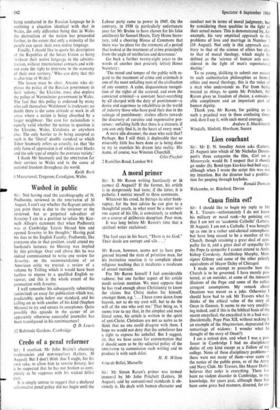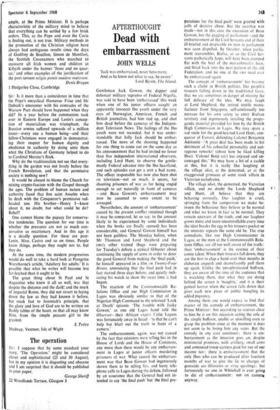Causa finita est?
Sir : I should like to begin my reply to Mr R. L. Travers—unfortunately I do not know his military or naval rank—by pointing out that I am not an 'academic Catholic' (Letters, 30 August). I am not a Catholic. I was brought up as one in a rather anti-clerical atmosphere, but have long ceased to be a member of the Church, though retaining a great deal of sym- pathy for it, and a great deal of sympathy for the Pope (a sympathy I cannot extend to Arch- bishop Cowderoy, Archbishop Murphy, Mon- signor Gibney and some of the other priestly equivalents of Mayor Daley of Chicago).
I made no attempt to prescribe how the Church is to be governed. I have merely pro- tested, as an outsider, at some of the innocent illusions of the Pope and some of the rather arrogant assumptions. My remark about Onanism was meant as a joke. Otherwise I should have had to ask Mr Travers what he thinks of the ethical value of the story of Onan in Genesis. It seems to me very unedify- ing indeed, and if this is the biblical basis of the recent encyclical, the encyclical is in a bad way. (Incidentally, Pope Pius XII, without making it an example of the Magisteriutn, deprecated the remarriage of widows: I wonder what be thought of the story of Onan?) I am a retired don, and when I was a pro- fessor in Cambridge I had no disciplinary duties of any kind except as a Fellow of my college. None of these disciplinary problems— there were not many of them—ever came to the notice of the public press, or of the Army and Navy Club. Mr Travers, like Mayor Daley, believes that order is everything. There has been no violent disorder in Cambridge, to my knowledge, for years past, although there has been some gross bad manners, directed, for ex- ample, at the Prime Minister. It is perhaps characteristic of the military mind to believe that everything can be settled by a few brisk orders. This, as the Pope and even the Curia is finding out, is not true. Military methods in the promotion of the Christian religion have always had ambiguous results since the days of Godfrey de Bouillon, Simon de Montfort, the Scottish Covenanters who marched to massacre all Irish women and children at Kilsyth under the banner 'Jesus and no quar- ter,' and other examples of the justification of the poet tantum religio potuit suadere malorum.







































 Previous page
Previous page